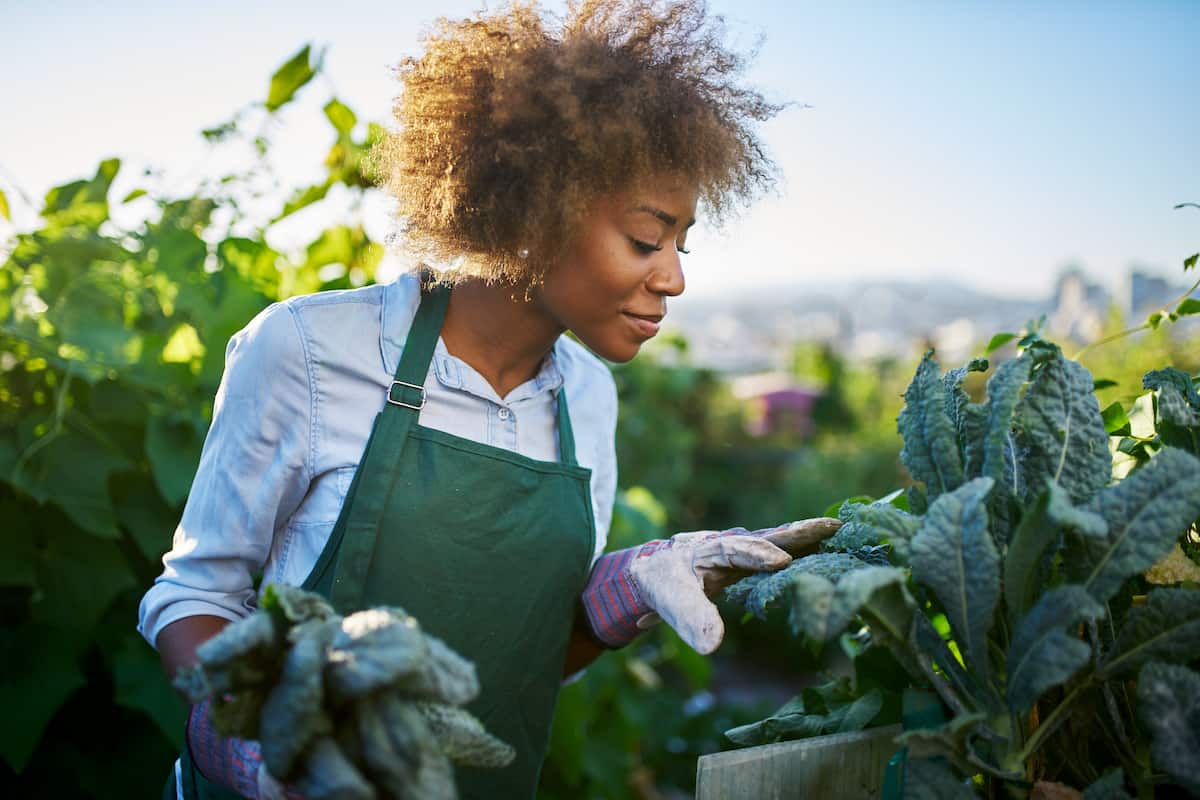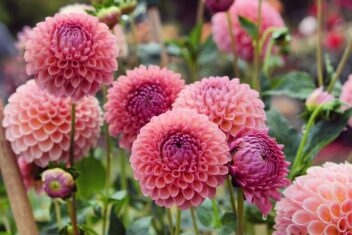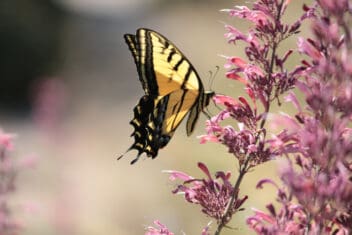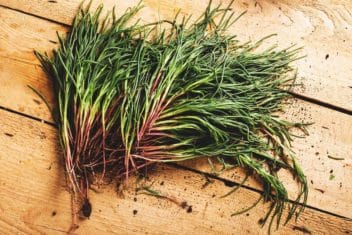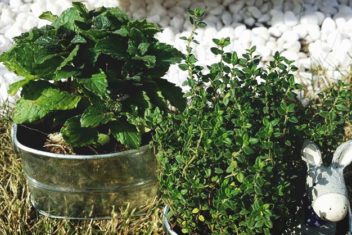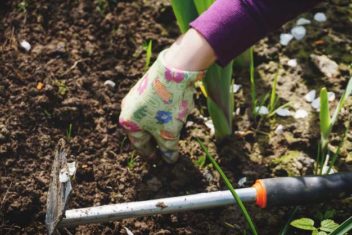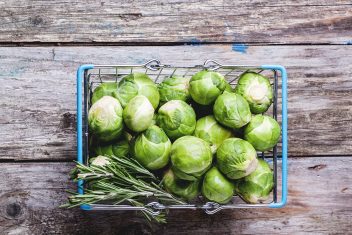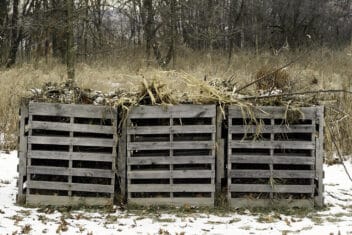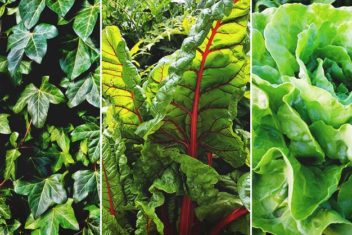If you’ve ever felt better after digging around in the garden, it isn’t just in your mind. There’s actual science to support the idea that gardening has major mental health benefits, helping you battle anxiety and depression.
I deal with anxiety on a regular basis. Right now, as a global pandemic rages on and protests against police brutality and systemic racism continue in North America, everything feels precarious.
My constant worry has morphed into feelings of sadness and despair. When lockdown started, seed starting was something good I could focus on. I’m not alone. Gardening is an escape for anyone that can improve your health.
Mental Health Benefits of Gardening
Starting out, my reasons for gardening had more to do with wanting to learn about where my food came from than anything else. I thought little about how my efforts might encourage pollinators. I didn’t think twice about what, other than education, my gardening hobby provided me.
It turns out that gardening has a slew of health benefits, including mental health benefits.
It’s fairly well known that gardening can be a physically demanding hobby. In turn, working hard in the garden – weeding, digging, building, harvesting – translates to physical benefits.
The advantages extend to mental wellbeing, too. Research has shown that gardening has the ability to decrease anxiety and help with depression.
In fact, recent studies show that exposure to the great outdoors, whether in a garden space or not, is correlated with a greater ability to regulate emotions and a decrease in the so-called “worry center” of the brain.
Since people are typically outside when they garden, it makes sense that the act of gardening produces the same anti-anxiety effects as other types of outdoor excursions.

Gardening is a relaxing activity that eases daily stresses and lifetime anxieties. It provides a welcome distraction in times of strife.
How Gardening Helps Your Mental Health
Gardening is a wonderful way to escape tension-filled situations and avoid dwelling on things that cause us to worry and fret.
It’s also a taxing hobby. It requires focus, determination, and grit. Gardening, in its complex way, delivers a balanced set of benefits. It’s at once a relaxing escape and a challenging obstacle to conquer.
Here are the ways that gardening can benefit your mental state.
Physical Exercise Helps the Mind
The physical benefits of gardening also translate into mental health advantages. While gardening isn’t as rigorous an activity as running or cycling, it does involves tasks that strengthen the body.
Exercise, in almost any form, is known to lessen the symptoms of mental health disorders such as anxiety and depression.
Being outside also exposes us to vitamin D. Sunlight, in healthy doses, is an important vitamin that is essential for overall health. Vitamin D also helps regulate mood.
Gardening and Mindfulness
Gardening also allows people to practice mindfulness. If you’re racking your brain trying to come up with moments of mindfulness in the garden, look no further than each time you stand back and admire the fruits of your labor.
In addition, gardening requires immense focus. Rarely do I spend time lollygagging in my outdoor oasis. I’m typically focused on the task at hand. When I’m concentrating on sowing seeds and manually extricating pests, I don’t have time to worry.
This kind of mindfulness is a strategy for treating anxiety and depression and it works regardless of whether it’s consciously being done or not.
Find Your Focus
Seasoned gardeners are well aware that it’s possible to choose which facet of gardening to focus on. When I’m feeling particularly stressed, I head to the garden to relax and unwind. I pick the easy tasks and spend my time doing the things I know I can complete – weeding, watering, for instance. It’s helpful to do these things when I’m feeling depressed.
When my aunt passed away, my ability to garden decreased significantly. Depression often causes people to lose interest in things they love. Everything felt difficult.
The energy and enthusiasm I once had for starting seedlings and organizing my raised beds vanished in an instant. I missed the seed starting portion of the season and when the last frost date passed, I decided to buy transplants from a local nursery to fill up the garden.
After that, I focused on watering and weeding, and not much else. My moments in the garden eased my sadness and helped me deal with my grief because they were some of the only moments I spent outdoors and I kept my to-do list simple.
I was still emotionally drained, but the things ahead of me were not so taxing that they felt impossible. I felt encouraged each time I watch a plant flower or fruit.
In moments when I feel particularly anxious – when my anxiety flares or when I start to worry about what the future holds – gardening serves a different purpose that impacts my mental health.
Yes, being out there relaxes me, but it also serves as a mental anchor. It’s something to concentrate on when my mind is racing. When my thoughts are flitting about, creating a garden to-do list helps calm my whizzing mind.
As the pandemic spread, checking in on my little seedling babies felt productive during difficult times. It was encouraging to watch them grow.
The immature plants would eventually go into the garden at some point and I was able to think about the future without dwelling on the global state of affairs. Thinking about the garden was a distraction and it gave me hope.
Community
Another beneficial mental health aspect of gardening is being able to meet and be around people. Social interaction can help ease mental stress. For people who have community garden plots, gardening often involves running into other human beings.
If you don’t have access to a community garden, consider finding gardening friends within your neighborhood. Is anyone growing veggies in their front yard like you are? Why not say hello?
Check local listings for horticultural society meetings to find likeminded individuals in your area. In the spring, find out where local seed swaps are happening and you just might find a new friend!
Creativity Helps the Mind
Studies also show that creative pursuits reduce levels of the stress hormone cortisol. While gardening isn’t necessarily a creative hobby for everyone, some people find joy in the artistry of garden and landscape planning.
Not One-Size-Fits-All
Gardening can be a tremendous boon for those suffering from anxiety and depression, but it’s not a cure-all. Gardening alone can’t cure mental illness.
It can certainly be part of a treatment plan, but if you’re dealing with perpetual anxious thoughts or feeling depressed, please speak to a mental health professional.
Gardening isn’t a quick fix for everyone, even for the most passionate gardener. It’s part of my self-care routine, for instance, but in the winter when I no longer have that outdoor outlet, I have to look to other things to keep my mind occupied and to promote relaxation.
If time in the garden doesn’t reduce your stress levels the way it does for other people, that’s completely fine.
However, gardening often works to improve your mental health and helps you focus on things that bring you happiness and calm.
What Kind of Garden Works Best?
I think it’s also important to add that gardening has mental health benefits whether you’re growing a few herbs on a small balcony or you’re cultivating a series of crops in a spacious backyard. It’s not the kind of garden that matters. It’s not how you garden that matters either.
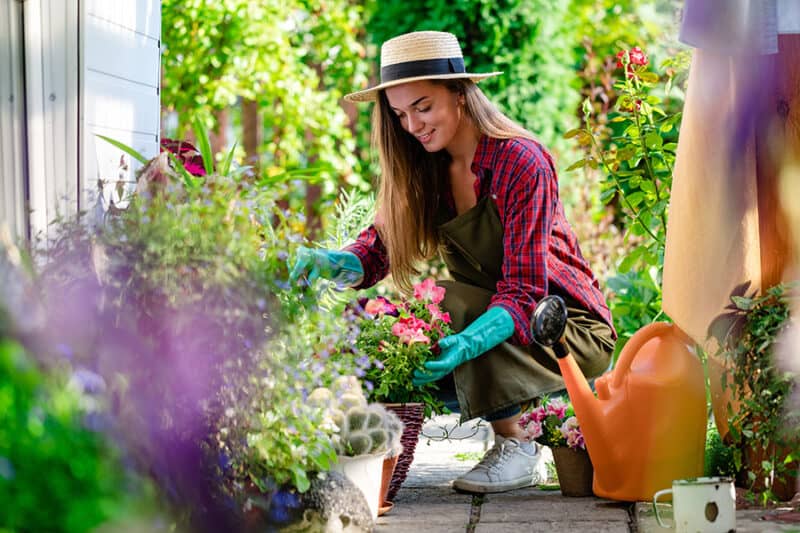
Neither is your skillset. Beginners and expert gardeners can all experience mental health benefits from being outside in the garden.
One study from 2017 showed that even a short time in the garden is enough to enjoy the activity’s mental health rewards.
As people rush to buy seeds online and flock to garden centers (while maintaining social distancing), it’s clear that we’re all beginning the recognize the importance of outdoor spaces.
People are realizing, now more than ever, that being able to grow food is an essential skill that’s been long forgotten by most communities.
I hope that with the re-introduction of pandemic victory gardens, it becomes starkly clear that being outside (and in our gardens, especially) is just as good for the soul as it is for our physical selves.
